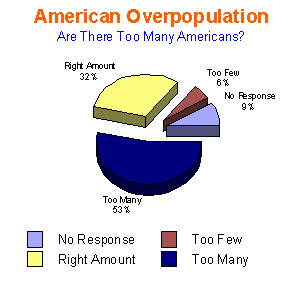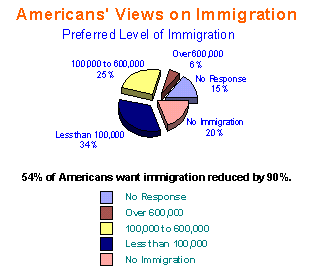A Survey Of American Attitudes About Population Size: Towards A Smaller U.S. Population (Executive Summary)
- NPG
- September 1, 1997
- Special Report
- 0 Comments
Executive Summary
A Survey Of American Attitudes About Population Size:
Towards A Smaller U.S. Population
Policy Makers Alert:
New Poll Reveals Clear Attitudes Regarding U.S. Population Size and Growth
To determine American public opinion with regard to U.S. population size and growth, NPG commissioned a Roper Starch survey. The survey, conducted in December 1995, was carried out with face-to-face interviews in the homes of about 2,000 nationally representative adults. It showed that a majority of Americans now recognize that population growth is a threat to the quality of their lives.
The Results Are Clear:
Halt Population Growth, and Reduce Immigration Drastically
 Most Americans Believe The U.S. Is Overpopulated And Favor Efforts To Halt Population Growth
Most Americans Believe The U.S. Is Overpopulated And Favor Efforts To Halt Population Growth
Most Americans believe the U.S. is overpopulated and favor non-coercive efforts to curtail or reduce population growth. A large majority of Americans want no further growth in the nation’s population and many would like to see it reduced. According to Roper, “a recent ROPER REPORTS survey found that 72 percent of Americans worry that overpopulation will be a serious problem in the next 25 to 50 years, up from 65 percent who worried about it in 1991.”
Most See Reducing Immigration Is The Easiest, Most Desirable Means Of Slowing Population Pressures
Unlike support for a variety of policy options that would promote fertility reduction, there is no hesitation whatsoever in supporting a reduction in the level of immigration.. According to Roper, “most Americans say they would like only about one-tenth the present number of immigrants per year. Indeed, 20 percent say they would like to have no immigration at all permitted into the United States… A total of 83 percent favor a number lower than the he present estimated 1 million new immigrants per year. Merely 2 percent favor an increase in the number of immigrants each year.”
Most Americans Believe Our Present Size
of 265 Million Or Smaller Is Optimum For The United States
A majority of Americans consider overpopulation to be a major problem that should be addressed immediately. An overwhelming majority (74%) favor tough measures to identify and deport illegal immigrants. Over half of all Americans (59%) said that the U.S. population today is too big, including 24 percent who said we have “far too many” people and 30 percent who answered “somewhat too many” people. An overwhelming majority (70%) of Americans think that immigration levels are excessive and should be reduced by nearly two-thirds (to less than 300,000 new immigrants a year).
Overpopulation Represents A Threat To The “Resource Base” Of The United States 
General comment: Half of all Americans now see the overpopulation trends as a threat of the “resource base” of the United States.
General observation: Half of all Americans now observe the impact of population growth on crowded roads, schooling, infrastructure, farmland, parks and their own communities, there is a new, fundamental awakening to the fact that endless development is not a panacea for a nation’s challenges. Lost is the “American way of life,” that intangible sense that low population density and abundant physical space are essential to American’s liberty and sense of freedom.
An Emerging Sense That Further Population
Growth Means A Continued Loss In The American Quality Of Life
The arguments in favor of population growth are losing favor among the general public.
The usual arguments one hears in support of a larger U.S. population are:
- This country needs population growth in order to have economic growth.
- We need continued growth to avoid a labor shortage.
- Unless the U.S. population continues growing, we will cease being a world power.
During the 19th Century and throughout the industrial revolution, the above comments were part of the American lore and an important part of the nation’s development. Yet times are changing. In all cases, only a small minority of Americans agrees with these statements today. According to Roper: “Relatively few people hold opinions which support an expanding population.”
On the other hand, all of the following are supporting by a majority of Americans:
- Although the issue of population growth does not require immediate attention, we should start thinking of ways to control it now. (59%)
- Overpopulation is a major national problem that needs to be addressed now. (55%)
- Continued population growth is a threat to America’s resource base. (50%)
According to Roper: “General public attitudes are consistent with the view that the population is too big. Over half of Americans (59%) advocate that the United States begin considering ways to ‘control it’s population’ [growth].” As a measure of how attitudes have changed, says Roper, “1 in 3 now thinks the U.S. needs to reduce its population in order to maintain a sound economy and environment over the long term.”
Groups Concerned About
Population Growth Move Across The Political Spectrum
The Roper survey found that the groups who most believe overpopulation is a “major problem” requiring immediate attention include:
- English-speaking Hispanics (67%)
- Westerners (66%)
- Middle-income earners ($15-30,000 a year) (63%)
- High school graduates (60%)
- Blue-collar workers (59%)
Whether their concern is rooted in congestion, job competition, resource shortage, environmental degradation or scarcity of public services, there is a clear new consensus that continued population growth is reducing , not increasing, America’s quality of life.
Conclusion:
- Congress should listen to the people and adopt policies that would halt, and eventually reverse, U.S. population growth.
- Congress should cut immigration to 100,000 a year of less, encourage small families through small family goals and incentives.
See the Associated Press story on the Roper Poll
See Dr. Leon Bouvier’s Report on the Roper Poll
- EARTH DAY 2024 - April 15, 2024
- We owe it to future generations… - April 13, 2024
- New NPG Forum Paper Explores the Role of Migrant Labor in US Agriculture - April 11, 2024
